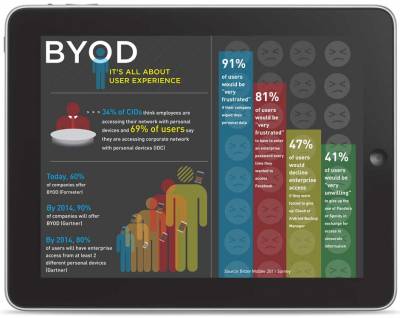Multifamily Blogs
Real Estate Technology | The Rise of BYOD In Multifamily: What You Need to Know
Real Estate Technology | The Rise of BYOD In Multifamily: What You Need to Know
After sifting through another stack of resumes and sitting through another round of interviews, you offer to hire a fresh college student to fill an open marketing position with the hopes that they’ll bring a new prospective on technology to your firm.
Your day ends and you go home happy and somewhat relieved.
The next day, as you prepare all the information that will be needed to properly orientate your new “tech-xpert”, your presented with a request from your new hire. They wish to bring their own mobile device to work, as it’s the tool they feel most comfortable using. This is now commonly becoming known as “BYOD” or “bring your own device.”
Your initial reaction might be that this could be an inexpensive alternative to supplying your new associate with company equipment. On one hand, it is cheaper if the employee supply’s their own expensive tech tools and the fact that the learning curve for the associate is reduced or eliminated means that the individual will become productive much sooner.
Unfortunately, while BYOD might initially look like the perfect solution, there are several elements that need to be taken into consideration, and additional policies put in place, before committing to allow any associate to bring their own device to work for your multifamily real estate investment firm.
After all, while IT departments these days are busy building business apps that solve problems and prove useful to the firm in general, one of the biggest fears IT professionals have with BYOD is the possible gaping hole that might be left in the company’s security as well as the endless list of possible technical concerns that may arise.
That Being Said…
To be competitive, you can’t limit your firms growth and access to information just because you’re unsure of how to implement a solid mobile or BYOD strategy.
Instead, you need to sit down with your IT department and run them through as many of the possible scenarios as you can image happening. From there, you should be able to work together to put policies and protocols in place that will either eliminate or detail how each concern will be addressed before it becomes a problem.
Consider This…
Once deciding to allow your new hire to bring their own device into the work environment, here are a few of the initial hurdles that need to be addressed.
One scenario finds your new hire working with your business contacts and using their own device for communication. Soon, your contacts will be trained to contact your company through that new hires personal device.
But, what happens if that associate quits or worse jumps ship to work for a competitor, essentially cutting you out of the loop entirely? What can you do, you don’t own the device?
What if they don’t quit, but lose their device at the latest convention, meeting, or they simply forget it at a restaurant?
Recent surveys have found that almost three quarters of all companies are developing new mobile business apps, and of those polled, half of them have admitted that a big part of what they are secretly developing is special proprietary applications designed to give their firms a competitive advantage.
Whoever finds that device will have access to any data stored on the device and any proprietary materials or documents as well. That’s not to mention the fact that with the device, they can now most likely gain access to your companies entire network.
Finally, as we briefly touched on before, what happens when the new hire has a technical concern with the device? Do you want them to contact your in-house IT expert or their random service provider?
As companies turn their attention towards finding new ways to optimize their services to benefit not only mobile devices, but to boost the collection and access of their business data and network access, BYOD can be a viable solution for multifamily real estate investors as long as these concerns are addressed.

Are you prepared to offer your associates the ability to BYOD? If so, how does your firm plan to address the obvious security issues?


